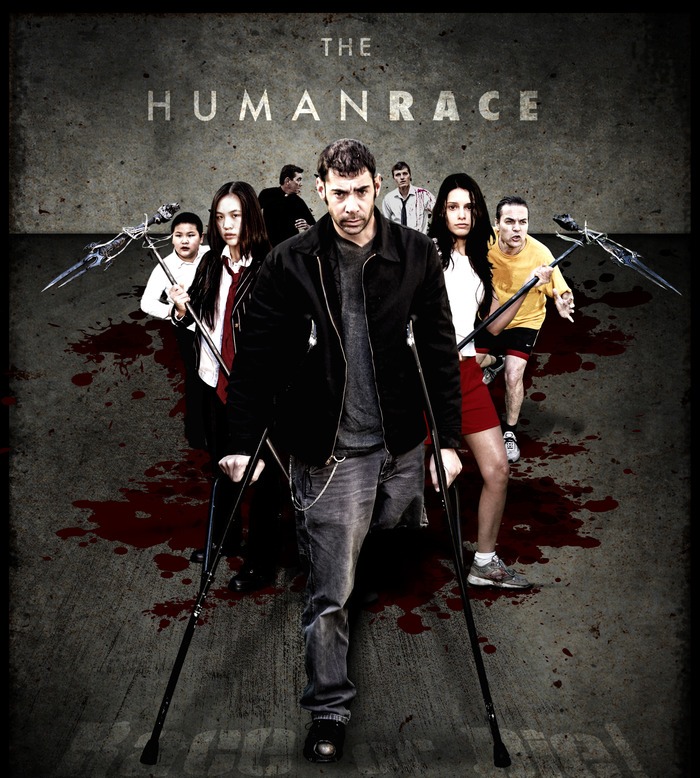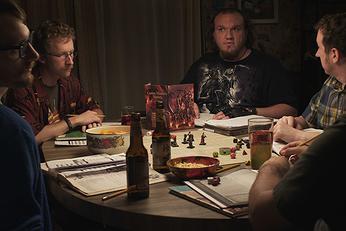About 3 years ago, I saw a short art film called Future Perfect in Tel Aviv’s Dvir Gallery. The premise for the film was that in the not-too-distant future, we’d all be equipped with a wondrous ocular device offering us the capacity to record, access and – most important of all – broadcast each and every social experience we encounter, through a tiny camera embedded in the frame of the glasses. Nah, I thought to myself. Too improbable, impracticable, fanciful.
Now, we’ve got Google Glass.

I thought about this a lot whilst watching Channeling, a flash and glitzy but yet surprisingly provoking – not necessarily thought provoking, but that’s a matter of individual taste, I suppose – film, due to screen at Utopiafest, the Tel Aviv International Festival of Fantastic Film, running between 21 and 30 September.
The premise is straightforward enough. After Wyld, thrill-seeker, Oxycotin-abuser and joy-rider dies in unexplained circumstances, his marine brother Max determines to get to the bottom of the mystery. Wyld was not any ordinary joy-rider, though: with a preference for high end performance vehicles, he had broadcast his exploits through his popular channel on Eye-Cast, a live and interactive broadcasting service facilitated through a camera embedded in a contact lens.
No, after Google Glass I’m not going to sniff at the fanciful premise.
Channeling has quite a few things going against it. The acting is sometimes wooden, the script – cribbing shamelessly from, of all things, the Fast & Furious franchise – cliched. There’s a fair bit of knuckle-dusting that is intended, I suppose, to enliven proceedings. Personally, I’m neutral when it comes to the whole gratuitous violence debate, but I do think that some of the beat-ups in the film have a rather pointless aspect to them.
Still, there is something in it. I’ve often wondered what Andy Warhol would make of social media were he still around today. Betwixt Twitter and Instagram and a million lesser digital interaction sites, many of us are in constant dialogue with hundreds or thousands or even more followers, fans, trading quips and exchanging barbs and generally creating a new context for human interaction. There is a lot to be said for this: there’s also a lot, largely unsaid, about the context that these new forms of connecting facilitate.
Max, aided by Wyld’s girlfriend Tara, uncovers a beguiling world of manipulation and coercion, driven by viewer ratings and advertising revenue. No, it isn’t at all fanciful: you only need to think about how effortlessly social media has nudged us into becoming performing seals to realise that Channeling is not only plausible, it is very possible.
But what appealed to me most about a film that was middling at best, was the neutrality that the film retains about the self-broadcasting in particular and the social/technological interface in general. I’m not sure it helps to wring one’s hands and bemoan what we have lost through the relentless march of soc/tech through our everyday lives. After all, I don’t particularly fancy going back to the horse and cart. Or a typewriter, come to think of it. These things are what they are. The challenge is not whether we can resist them, but rather how much we can prevent ourselves from becoming imprisoned by them.

Imprisonment, albeit of a more temporal nature, underscores The Human Race, a pretty bleak indictment of human nature in general. Out of the blue, the 80 random people populating a city block on a bright and sunny afternoon are mysteriously transported to an anonymous, deserted complex. The rules are simple. They’re to run a race round the complex, following a series of signposts. Step off the path, and you die. Get lapped twice, and you die. Stop racing, outside designated rest points…you get the picture. Race goes on until the last man or woman is standing. Let the fun and games begin?
As you’d expect, what we are presented with is a motley assortment of characters with little in common with one another. Veronica, who has just overcome the lymphoma that killed her mother and sister. Justin and Eddie, vets from Afghanistan who have a bromance underscored by the fact that Justin saved Eddie’s life. A devout muslim. A couple of municipal street workers, burly brawny types. A pair of deaf-mutes, one much more optimistic about the fate of mankind than the other.
The Human Race is not a particularly original film in itself. The notion that we reveal our true selves when under extraordinary pressure is not a new one, nor necessarily a correct one. That aside, the Paul Hough written and directed debut feature takes at least some cues from Suzanne Collins’ The Hunger Games trilogy, and further back the Richard Bachmann/Stephen King novella The Long Walk. Also, there’s something disconcerting about the production values of The Human Race, almost as if it is wearing its low budget credentials as a badge of honour. Maybe it’s me. I’m not sure.
All that said, The Human Race does evoke an impressively convincing – if, of necessity, bleak – assessment of personal morality. There are moments that are unbearably sad, others just as unbearably predictable. And it is my firm view that the ending, far from providing a plausible explanation for the perverseness of The Human Race, instead undoes 90 minutes of fair-to-good going. But in an odd way, it fits the spirit of film. When a pastor, one of the 80, starts to ruminate about allegories and staying on the path but still not quite getting why God is doing this to them, one has a thought: perhaps it is wiser not to think too much about the grand purpose of things, but instead get busy with the business of living.

After all this doom and gloom and heavy thinking about the future of mankind, I’m pleased to report that Zero Charisma is a thoughtless film. And I say this in the best possible way. Scott, long past the first flush of youth, lives with his disabled grandmother and works as a delivery boy in a fast food joint. He did once have his dream job – in one of those stores that sell fantasy role-playing board games (think Dungeons & Dragons on steroids). But a contretemps with the management, plus the belief that his self-designed fantasy board game (still looking for a publishing deal) is the real deal left him cast out into the outer darkness.
Not that he behaves as if he knows this. A bully, a braggart, thoroughly unpleasant, he surrounds himself with a coterie of…well, there’s no other way of putting this, but losers for his weekly board game. And, since he is the owner – and designer – of the game, he gets to be the game master and call all the shots. There are few things more dangerous than a little power in the hands of a small person. One of his posse wants to pull out of the game after his wife phones to say that she is leaving him. Scott: “O-kay…we’ll take five and back to the board, ok?”
But Scott’s low-reaching ambition is snatched out of grasp by a sequence of unpredicted events. First, his grandmother Wanda, garrulous and cantankerous, suffers a stroke that makes her a fair bit more of the same. Then Barbara, Scott’s mother, turns up unexpectedly, clearly up to no good and with new boyfriend/lap-dog Bob in tow. There’s no love lost between grandmother, mother and son: after all, as Wanda puts it pithily, Barbara did abandon Scott when he was 10 to “go grow Marijuana in Mexico.” She’s hardly been back since. What could she want?
But the real threat to Scott’s sense of order – and petty dictatorial power – comes from Miles, who joins Scott’s weekly game after a space becomes free on the table. Miles wears skinny jeans and heavy framed glasses, sports a full beard and edits the uber-popular geekchic.com website. It’s never entirely clear whether he is laughing with, or laughing at the enthusiasm of Scott’s playmates. They don’t seem to mind, as it happens. But for Scott, unreconstructed knuckle-dragging heavy metal-listening nerd, Miles stands for everything he loathes. And he is stealing away his power base too. This. Is. War.
Zero Charisma is a surprisingly charming film, surprising given the complete loathsomeness that inhabits all the principal characters. Ultimately, it comes down to a clash of values, Scott’s nerd and Miles’ geek. Who wins? It’s no surprise that it comes down, ultimately, to who is most capable of being true to himself. But with antecedents such as his, Scott is going to have quite a task beating down the usurper for his crown.
Utopia will take place from September 21 – 30, 2013. The full program of films and events may be viewed on the festival website. To reserve tickets for films, call 03-6060800.
Channeling (2013)
Starring Landon Ashworth, Bernardo Badillo, Kyle C. Beach
Written and Directed by Drew Thomas, 107 minutes, English
Utopia Screenings: Sept 23 at 21:15 and Sept 24 at 16:00 in Hall 5, Tel Aviv Cinematheque
The Human Race (2013)
Starring Paul MacCarthy-Boyington, Eddie McGee, Trista Robinson
Written and Directed by Paul Hough, 87 minutes, English
Utopia Screenings: Sept 22 at 19:00 in Hall 5, Tel Aviv Cinematheque
Zero Charisma (2013)
Starring Sam Eidson, Anne Gee Byrd, Brock England
Directed by Katie Graham and Andrew Matthews, English
Utopia Screenings: Sept 22 at 16:30 in Hall 5, Tel Aviv Cinematheque





